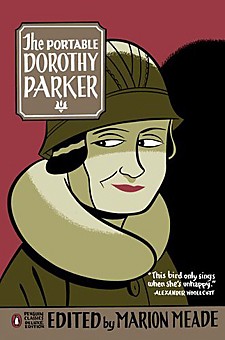There is one thing that needs to be said about “”The Portable Dorothy Parker,”” first of all: It is anything but “”portable.””
The old “”Portable”” books were small, inexpensive paperbacks designed for soldiers to carry around, and it was in this format that the contents of this book, chosen by the author herself, first appeared in 1944.
Now, more than 60 years after its first appearance, the book has been bulked up to more than twice its original length. You’re not going to be able to store this one in your pocket.
Still, more Dorothy Parker has never been something to complain about ð- unless you were on the receiving end of one of her blistering gibes. That’s right, she’s the one who came up with “”Men seldom make passes/At girls who wear glasses.”” Parker didn’t wear glasses.
“”If all the girls who attended the Yale prom were laid end to end,”” she once opined, “”I wouldn’t be the least surprised.””
Between drinks and put-downs, Parker found time to write short stories, poetry, letters and often scathing reviews. Embracing as it does the many sides of her career, the latest edition of “”The Portable Dorothy Parker,”” revised by Parker biographer Marion Meade, is the perfect introduction to one of the great wits of the 20th century.
Rating
8/10
Her short stories take up the bulk of the book, and they’re the strongest things here. Parker’s award-winning novella “”Big Blonde”” offers a glimpse into the loneliness at the heart of a typical partygoer of the roaring ’20s.
Short, zippy vignettes like “”The Sexes”” and “”Dusk Before Fireworks”” reveal Parker’s gift for dialogue. She had a knack for capturing the pointless conversations that certain couples have, going from endearments to mutual outrage in the space of a few lines.
Perhaps the most memorable story is “”Arrangement in Black and White,”” a scathing attack on racism in the form of the monologue of a snooty society matron as she patronizes a Paul Robeson-like black musician. The story takes on new meaning in light of the fact that Parker left her entire estate to Martin Luther King Jr.
Parker’s poetry is a mixed lot. The conventional romantic poetry seems watery and trite now, though her more famous satirical verses still sting. On drinking: “”I’ll have one or two at the most/Three and I’m under the table/Four and I’m under the host.””
We also get a hefty chunk of Parker’s “”Constant Reader”” reviews for The New Yorker. Most of the books and plays have tumbled into the dustbin of history, but the reviews are still crisp and memorable.
Parker disliked whimsy. She reserved a special scorn for A.A. Milne, which may seem churlish now, though a long review of one of his plays makes it sound so awful one wonders how it ever got staged. As for Milne’s best-known creation, Winnie the Pooh, Parker confesses that “”Tonstant Weader Fwowed up.””
She did like Dashiell Hammett – “”so hard-boiled you could roll him on the White House lawn”” – and Ernest Hemingway, though a positive review of one of his books dwells largely on how sick she is of hearing about him.
The book concludes with a hilarious selection of Parker’s personal correspondence, enough to make you wish there was an entire book’s worth of it.
This new edition, thankfully, has been freed of the sneering introduction by Brendan Gill that tarnished the old edition. It has also been reset in a more readable type; the old edition’s type was so archaic-looking you felt yourself aging by decades as you read.
Even better, the cover has been designed and illustrated by the cartoonist Seth, whose witty artwork suggests Charles Schulz’s “”Peanuts”” characters set down in the Art Deco world of the 1920s.
Parker didn’t want to be remembered primarily as someone who said funny things at parties. “”It got so bad,”” she once complained, “”that they began to laugh before I opened my mouth.””
This book ought to go some way toward rescuing her reputation as a serious writer – albeit one who couldn’t help being funny.









